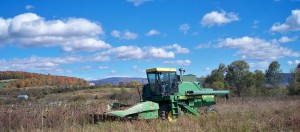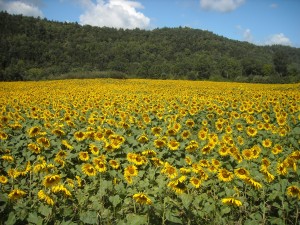Sunflowers Crops –
An emerging source of renewable energy
By Rachel Carter
Sunflowers are grown on several Vermont farms and then harvested for their oilseeds, which are then converted to biodiesel and livestock feed. Sunflower or oilseed biodiesel helps farmers lower fuel and feed costs, explore feed and fertilizer co-products, be more self-sufficient, and rely less on fossil fuels.

State Line Biofuel Farm in Shaftsbury, VT and Ekolott Farm in Newbury, VT are growing a combined 30 acres of sunflowers for Green Mountain Power. Photos courtesy of Vermont Sustainable Jobs Fund.
State Line Biofuel Farm in Shaftsbury and Ekolott Farm in Newbury are growing a combined 30 acres of sunflowers for Green Mountain Power. Once the sunflowers wilt this fall, they will be harvested, dried, and pressed. The raw oil will be converted into biodiesel, or B100 and the nutrient-rich meal is then fed to farm animals. The fuel will be used in Green Mountain Power’s vehicle fleet and to help heat buildings. Depending on the crops’ success, the cost of fuel to Green Mountain Power could be up to one dollar less than current B100 prices.

Ekolott Farm sunflowers
“Projects like this really help support Vermont farmers, plus it’s beautiful to see the fields of sunflowers and even more beautiful to realize it will provide a clean and local power source,” says John Williamson of State Line Farm Biofuels.
Over the years, State Line Biofuel Farm and Ekolott Farm have been working closely with UVM Extension for technical research, analysis, and support, and the Vermont Bioenergy Initiative for infrastructure development to increase their energy self-sufficiency and develop financially sustainable oilseed-to-biodiesel processing business models.
“Several pioneering farmers in Vermont now have the necessary infrastructure to produce sustainable biodiesel,” notes Chris Callahan, UVM Extension Agricultural Engineer. “This is a unique model: local production for local use. The partnership with Green Mountain Power means more gallons will be made which means lower cost for everyone.”
Green Mountain Power President and CEO Mary Powell states, “the goal is for local biodiesel production to both shave fuel costs for our customers while helping to develop new markets for locally produced liquid fuels. We see this benefitting local farms and customers as we work together to provide more clean cost-effective and reliable power.”
The Vermont Bioenergy Initiative partners with UVM Extension to support research, technical assistance, and infrastructure development in emerging areas of bioenergy and coordinates with the Vermont Farm to Plate Initiative to support energy crops grown alongside food production.
More information at www.VermontBioenergy.com.
Rachel Carter is the Communications Director at Vermont Sustainable Jobs Fund.








Leave a Reply